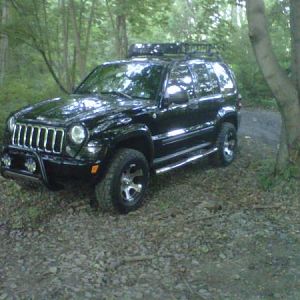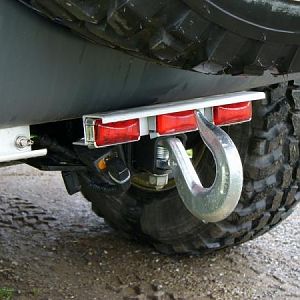I was curious if anyone else has experienced this or knows anything about it. I have a 2003 KJ Sport with 3.7 engine. I purchased the Jeep used this past spring. Through the summer months I routinely recorded averages of 19 mpg on my daily route to work and back. Starting about a month ago I noticed my mpg had dropped to 17 mpg. I haden't changed my driving habits or the routes I usually take. Since that first reading I've checked it again several times, always with the same results, about 17 mpg. I've changed the filters and tried everything to no avail. I buddy of mine at work who is also a good mechanic, told me that the change to winter fuel blends was the culprit. I live in western PA. and know that every fall local gas stations always change to there winter formulas. I just wondered if what my friend suggested could be true, is it possible that the change over to winter blend fuel has caused my sudden drop in gas mileage? Any and all comments appreciated.
You are using an out of date browser. It may not display this or other websites correctly.
You should upgrade or use an alternative browser.
You should upgrade or use an alternative browser.
Winter versus summer fuel
- Thread starter millman44
- Start date
Disclaimer: Links on this page pointing to Amazon, eBay and other sites may include affiliate code. If you click them and make a purchase, we may earn a small commission.
JeepJeepster
Full Access Member
Ive heard about that too...
Have you changed the spark plugs? How many miles do you have? Replace them with the OEM NGK's if you do replace them.. O
Have you changed the spark plugs? How many miles do you have? Replace them with the OEM NGK's if you do replace them.. O
Marlon_JB2
Kombat Edition Jeep
That is true. Winter diesel is a killer as well.
In the winter, you average about 2 or so MPG less.
In the winter, you average about 2 or so MPG less.
grogiefrog
Full Access Member
My mpg always goes down in winter. It could be the cold weather and taking longer to warm up, at least on short trips. But I too have heard that it's the fuel, to cut back on air pollution. Sounds kind of weird to have vehicles burn more fuel to get cleaner air! confused.gif
jfortier777
Full Access Member
When your engine is cold, it recieves a larger amount of fuel. So until the vehicle is warmed up, its recieving a more fuel heavy air/fuel mixture.
This deffinitely contributes to a loss of mileage, I would imagine it to be somewhere around 1 or 2 mpg.
Winter blend gas is a combo of two things.
-anti-gel additives, (esp diesels)
-and the end of anti-ozone chemical removal which is done during the summer to prevent ozone issues due to the extreme summer heat.
This *usually* results in lower prices at the ice covered pump since the latter is much more costly than the former.
I haven't found much info to substantiate that the blend is causing significant loss in fuel economy.
It seems that warm up time for the engine is the #1 culprit.
*EPA regulations require the following:*
"The Environmental Protection Agency requires that certain volatile chemicals in gas sold between May 1 and Sept. 15 are removed so they can’t evaporate in the heat and react with pollutants to create ozone, a main component of smog."
This deffinitely contributes to a loss of mileage, I would imagine it to be somewhere around 1 or 2 mpg.
Winter blend gas is a combo of two things.
-anti-gel additives, (esp diesels)
-and the end of anti-ozone chemical removal which is done during the summer to prevent ozone issues due to the extreme summer heat.
This *usually* results in lower prices at the ice covered pump since the latter is much more costly than the former.
I haven't found much info to substantiate that the blend is causing significant loss in fuel economy.
It seems that warm up time for the engine is the #1 culprit.
*EPA regulations require the following:*
"The Environmental Protection Agency requires that certain volatile chemicals in gas sold between May 1 and Sept. 15 are removed so they can’t evaporate in the heat and react with pollutants to create ozone, a main component of smog."
MoladoGuy
Full Access Member
What about your tire pressure? I'm sure the change of warm air to cold air may have some sort of effect on tire pressure....lower tire pressure means lower gas mileage?
Just a thought.
Just a thought.
- Some Canadian auto smart websiteTire Inflation
Your tires need special attention during the winter. Cold temperatures decrease the air pressure in tires. This just adds to the rolling resistance caused by snow and slush. Each tire that is under–inflated by 2 psi (14 kPa) causes a 1 % increase in fuel consumption. So check tire pressures regularly, especially after a sharp drop in temperature.
Correct tire pressure is vital for fuel economy, safe vehicle handling and long tire life. Before adding air to your tires, let some air out of each valve and blow some air out of the hose. This prevents moisture from gathering in the tire valve, where it can freeze and cause the valve to leak. If possible, use your own tire pressure gauge, since the gauges built into air pumps at service stations are often inaccurate or missing.
JeepJeepster
Full Access Member
Thats why i started that "check your tire pressure!" thread.. Everyone needs to do that before winter sets in. Mine were 32 the other morning, down from 36..
Marlon_JB2
Kombat Edition Jeep
I caught mine at 36, down from 40.
kjpilot
Full Access Member
If MPG goes down in the winter on a gasoline vehicle, it is because of government regulation. Many places around the US are required by the EPA to switch to a reformulated winter gas, usually ethanol.
Ethanol produces about 60% of the energy as gasoline does. So if you could burn pure ethanol in your kj (you can't) and you changed nothing about your driving style you would use 40% more ethanol than gasoline. so if you got 19 MPG on gas, you'd get 11.4 MPG on straight ethanol. The reformulation requirement is 10% ethanol & 90% gasoline, so for 10% of the fuel you are getting 40% less power. That translates to about 5% less fuel efficeincy with a 10% blend So, if you got 19 MPG before, you now get 18 MPG.
Another likelyhood is cooler air is more dense. This requires more fuel to be mixed with the dense airto obtain the proper mixture proportion.
Tire pressure is also an issue as the air cools. The air contracts in your tires so the pressure goes down significantly. This is easily overlooked, especially if your tires don't loose pressure when the temps are stable.
Just some ideas... I'm clueless about diesel issues by the way!
Ethanol produces about 60% of the energy as gasoline does. So if you could burn pure ethanol in your kj (you can't) and you changed nothing about your driving style you would use 40% more ethanol than gasoline. so if you got 19 MPG on gas, you'd get 11.4 MPG on straight ethanol. The reformulation requirement is 10% ethanol & 90% gasoline, so for 10% of the fuel you are getting 40% less power. That translates to about 5% less fuel efficeincy with a 10% blend So, if you got 19 MPG before, you now get 18 MPG.
Another likelyhood is cooler air is more dense. This requires more fuel to be mixed with the dense airto obtain the proper mixture proportion.
Tire pressure is also an issue as the air cools. The air contracts in your tires so the pressure goes down significantly. This is easily overlooked, especially if your tires don't loose pressure when the temps are stable.
Just some ideas... I'm clueless about diesel issues by the way!
glaurick
Full Access Member
kjpilot said:Another likelyhood is cooler air is more dense. This requires more fuel to be mixed with the dense airto obtain the proper mixture proportion.
You are correct sir, Most new cars have an intake temp sensor, colder air requires more fuel, of course you could always trick it by moving it to a warmer location, but I don't advise that. That combined with warm ups are the main factors.
Similar threads
- Replies
- 4
- Views
- 835
- Replies
- 18
- Views
- 3K
- Replies
- 1
- Views
- 454
- Replies
- 7
- Views
- 941
Latest posts
-
What makes a Farm Land For Sale In Goa a necessary investment?
- Latest: Buylandingoa
-
-
-
-










